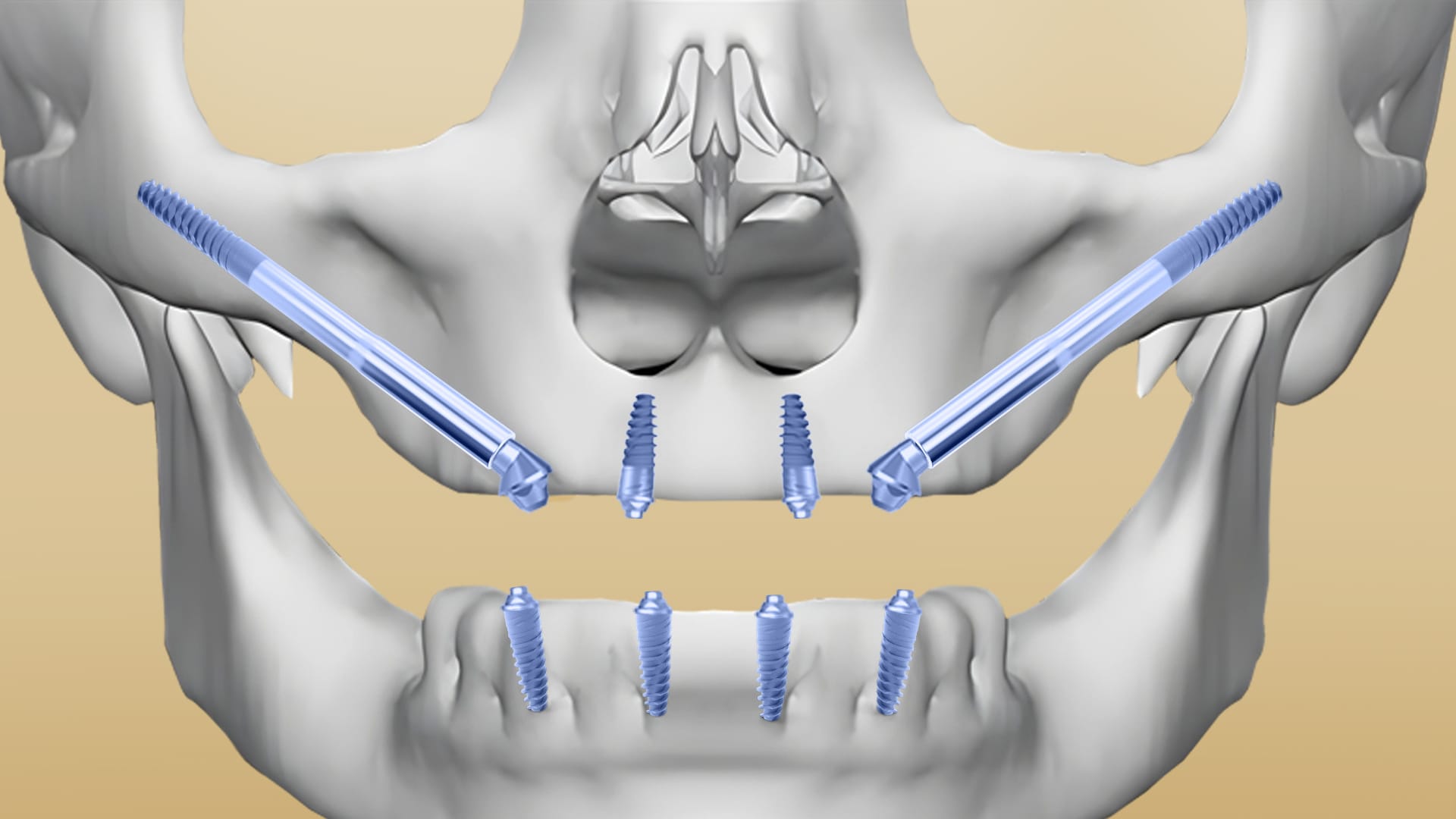Implantation – the most durable and comfortable solution
Restoration of the edentulous jaw with implants provides an opportunity to fully restore both the upper and lower jaw, ensuring strength, aesthetics and comfort. Depending on the condition of the bone tissue and the patient's needs, two methods are used for the procedure:
✅ Upper jaw restoration. If there is sufficient bone tissue, standard implantation is used, using 4 or 6 implants. If the bone has fused, or if sinus floor augmentation is required, long implants and the Maxilla-for-All® methodology are used, which allows ensuring stability without bone augmentation.
✅ Lower jaw restoration. When restoring teeth in the lower jaw, 4 or 6 implants are used, which are stably anchored in the bone, ensuring high-quality chewing function and long-term results.
Implantation – for those who want to preserve youthful facial features
Missing teeth have a significant impact on the shape and structure of the face. When teeth are practically gone, the jawbone no longer receives the natural chewing load. And in nature, what is not used disappears. Due to bone resorption, the lower part of the face looks shorter, the skin around the cheeks and mouth sags. Over time, the face can become sunken and look significantly older, because the lips and cheeks no longer have the support that the teeth should provide. Therefore, implantation not only restores chewing function, but also stops the melting of the jawbone - it receives sufficient stimulation again.
Comfort without compromise
Dental implant restoration not only restores the aesthetics of your smile, but also restores the natural sensation of chewing. No discomfort or specific care associated with outdated dentures – you can completely forget that you are chewing and smiling with non-natural teeth. The freedom to enjoy eating, talking and smiling without fear of dental stability is truly an invaluable change in your quality of life.
Instant playback
Restoration of the edentulous jaw is usually combined with immediate implantation, i.e. the missing teeth are removed and the implants are inserted during the same, 1st visit. This shortens the time until prosthetics, because after removing the teeth, there is no need to wait for the bone to heal for implantation. Temporary teeth are attached after just a few days, and after the implants have fully healed, after a few months, you will be able to enjoy restored teeth made of natural-looking, highest quality zirconia.
Practice has shown that immediate implantation immediately after tooth extraction is just as safe and stable as regular implantation. Immediate implantation requires extensive experience and special knowledge of the surgeon, so not all dental clinics can offer it.
When choosing instant implantation, the patient experiences half the discomfort - instead of two surgical interventions, the entire process is performed in just 1 visit.
Oral surgeon-implantologist Dr. Soheil Bechara
Dental implantation at Bechara Clinic is performed by Dr. Soheil Bechara , an oral surgeon with two decades of experience and recognized in Lithuania and abroad , who has restored the smile of tens of thousands of patients. You can be assured of an extremely fast, painless and effective solution even in the most complex cases. If you feel strong fear - surgical procedures will be performed under anesthesia - intravenous sedation or general anesthesia.
Treatment course

CONSULTATION
During the initial consultation, detailed dental X-rays are performed, the condition of the jaw is assessed, and an individual treatment plan is drawn up.

IMPLANTATION
If necessary, the remaining teeth are removed and, during the same visit, dental implants are inserted.

TEMPORARY TEETH
After a few days, temporary teeth are attached to the implants, allowing you to return to social life and chew food.

PROSTHESIS
After 2-4 months and after the implants have healed, a permanent zirconia prosthesis is attached to them, which looks extremely natural.
Patients before and after
Current questions about the restoration of an edentulous jaw
How is Maxilla-for-All® different from conventional edentulous jaw implantation?
The Maxilla-for-All® method is used in patients with bone deficiency in the upper jaw , when conventional implantation would be difficult or less effective - in this case, instead of conventional implants, long ones are used, fixed in the cheekbones and nasal bone. Bechara Clinic applies both long implants and conventional tooth restoration on 4-6 implants, depending on the individual patient's case and needs.
What does the number of threaded implants depend on?
Depending on the condition of the jawbone and the number of teeth desired to be restored, 4 or 6 implants are used to ensure the stability of the prosthesis.
How many teeth are restored on 4-6 implants?
Most often, 12 teeth are restored. If the condition of the jawbone is poorer, in order to avoid the risk of fractures, it may be recommended to restore fewer teeth, 10, or to insert a larger number of implants (6 instead of 4).
How long do dental implants last?
Properly cared for dental implants can last a lifetime.
Why are temporary teeth attached after implantation, instead of a permanent prosthesis?
After implantation, temporary teeth ensure proper implant fixation (bone healing) and tissue healing. A temporary prosthesis restores aesthetics and functionality, while protecting against excessive pressure that may occur when using a permanent prosthesis too early. For the next few months, you should avoid heavy chewing loads and eat softer foods to achieve a quality long-term result. After healing, the implants become more stable, so the permanent prosthesis installed later will last longer and be stronger. Some doctors mislead patients by offering a lower price and leaving temporary teeth as permanent, but this poses a risk of fractures of both the prosthesis itself and the implants, because temporary teeth are made of plastic, not zirconium oxide, which lasts for many years and looks more natural.
Current questions about implantation
Why is it so important to restore lost teeth with implants?
Dental implant restoration is important not only for the restoration of appearance or chewing function, but also for the overall health of the oral cavity. When teeth are lost, the jawbone, without receiving the chewing load, begins to decay and dissolve, which is why adjacent teeth change their position, an irregular bite begins to form, and the shape of the face changes. A smile restored with dental implants gives self-confidence and the courage to smile and laugh without complexes.
In which cases is dental implantation not recommended?
Dental implantation is not recommended for patients under the age of 18 whose jaw is not yet fully formed.
What are the stages of dental implant restoration?
Consultation
During the consultation, the doctor takes an X-ray and, after assessing your case, presents dental implant options and creates a treatment plan.
Surgery
To avoid any pain or discomfort, local anesthesia is applied to the oral cavity or, if desired, intravenous sedation or general anesthesia.
During the surgical stage, if necessary, the remaining teeth or their roots are removed, or immediately in the places of missing teeth, after opening the gums, implants are inserted and the gums are sutured.
Prosthetics
Over the next few months, the titanium dental implants fuse with the jawbone during the osseointegration process. After 2-4 months, and after it is confirmed that the threaded implants have healed, the final prosthetic stage begins. During this stage, fixed, non-removable zirconia prostheses are attached to the implant, made individually in a dental laboratory, taking into account the patient's bite, previous or desired tooth color and shape.
What is instant implantation?
Immediate (one-time) implantation is a procedure where dental implants are inserted into the site of the removed teeth immediately after extraction. This allows for a shorter recovery time, as there is no need to wait for the jaw to fully heal before implantation (saving 3-6 months).
Is instant implantation painful?
Implantation is performed under local anesthesia or sedation, so the patient does not feel any pain during either the tooth extraction or the implant placement. There may be some soreness after the procedure, but this is easily controlled with pain medication.
When choosing instant implantation, you experience less discomfort - instead of two visits for surgical procedures, the entire process will be completed in just one visit.
Can immediate implantation be performed in all cases?
Yes, an experienced surgeon can perform immediate implantation in almost all cases . Although certain conditions, such as bone density or infection, can complicate the procedure, an experienced specialist is able to select the most appropriate methodology and implants even in complex situations.
Is instant implantation riskier than regular implantation?
No, instant implantation is not riskier than regular implantation. On the contrary, when performed by an experienced specialist, it ensures faster healing and more effective bone preservation.
The success rate for both immediate and traditional implantation is very similar.
How to prepare for a dental implant procedure?
Before undergoing a dental implant procedure, a consultation and a thorough examination are required. During the consultation, a panoramic X-ray is taken, options are discussed, and a treatment plan is created.
If you are having local anesthesia, you may eat something light a couple of hours before the procedure. If you are having the procedure with intravenous sedation, you must not eat or drink anything for 6 hours before the procedure. If you are having the procedure with sedation, you must come with an accompanying person to ensure your safe return home.
What should I know after a dental implant procedure?
After the dental implant procedure, swelling can be expected, which occurs for the first 3 days. It is advisable to follow all the doctor's recommendations and instructions. Avoid rinsing your mouth too vigorously, and do not touch the implanted area with your tongue or fingers, so as not to open the wound, which can delay the healing process. It is also recommended to refrain from smoking for as long as possible, at least for 2-3 days, as it can make it difficult for the implant to heal. Heavy smoking can also be a cause of implant failure.
It is advisable to start by gently rinsing your mouth with warm water or mouthwash every 2-3 hours, if your doctor has prescribed it. After a few days, you should start rinsing more often – 3-4 times a day, and continue this for two weeks.
For about a week, it may be a little more difficult to chew or open your mouth, bruising may appear that will disappear within a few days, and your lips may also become dry and cracked - keep them moisturized with cream or petroleum jelly.
For the first 24 hours after the procedure, it is recommended to consume only foods that do not require chewing (porridge, yogurt, purees, etc.). Food and drinks can be warm, but never hot. Hot food and drinks can cause more and longer bleeding. Avoid hard, crunchy, sticky, hard-to-chew, and spicy, acidic foods. It is important that dental implants receive as little pressure and chewing load as possible.
What are the prices of dental implants?
You can find dental implant prices HERE .



